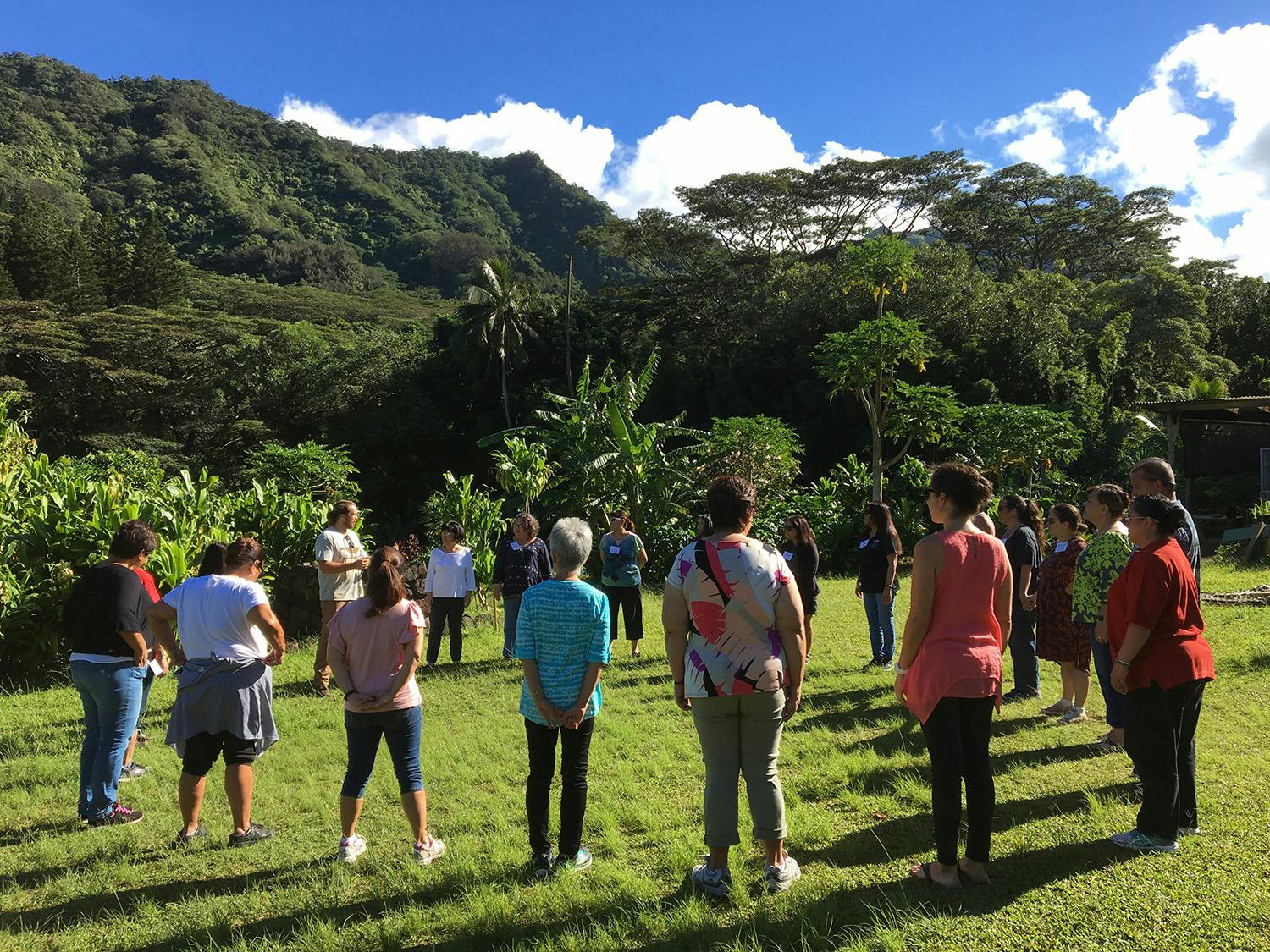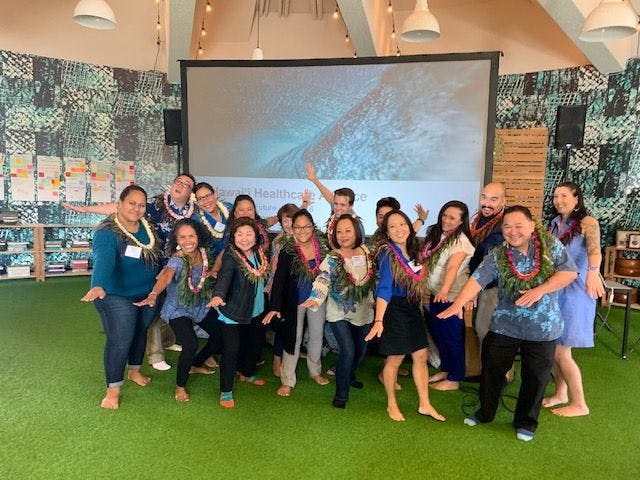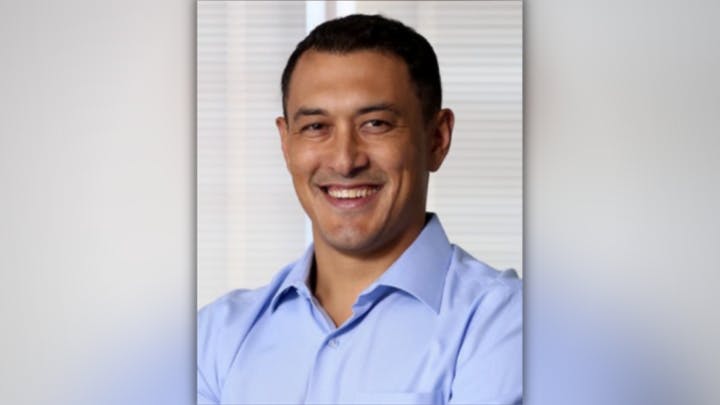
Photo courtesy One Shared Future
Dedicating her career to improving the quality of life for people in Hawai‘i, Rachael Wong, Cohort III, has held nonprofit leadership roles at Healthcare Association of Hawaiʻi, Kōkua Mau (state hospice & palliative care organization), and the Hawaiʻi Consortium for Integrative Care.
After serving as director of the State of Hawai‘i Department of Human Services, Rachael came up with the idea for and launched One Shared Future in 2017. She gathered a team to reimagine support for workers in the nonprofit and public sectors – the people that make community change happen. Today, One Shared Future creates customized professional development experiences that increase the efficiency of organizations and community initiatives, often making immediate, real-time impact. More than 300 professionals from over 55 nonprofit, government and private sector organizations statewide have completed a series of One Shared Future’s interactive workshops.
Hawai‘i Leadership Forum (HLF): Tell us about One Shared Future – what are you doing and how do you hope to have impact?
Rachael Wong (RW): One Shared Future (OSF) is a social impact business that invests in people. We create safe spaces for people to come together, learn about self and others, gain trust, and collaborate. We achieve this through professional development, facilitation, and consulting services that affirm strengths and create the conditions for collective innovation. OSF started by working with professionals in the state executive branch and broadened to include mixed groups of public, private, and nonprofit sector members. If we are going to address the seemingly intractable issues in Hawai‘i, the right people must be at the table. In addition to our cohort-based series, Appreciating Change and Accelerating Impact, we also offer shorter series for workplace teams: Strengths and Self-Care, Embedding a Strengths-based Culture, and other tailored services.
Impact occurs at the individual, workplace, community, and statewide levels: an external evaluation found that participants gain increased self-awareness, are more willing to engage in difficult conversations, have more energy and deeper, broader networks, and shift from a “no can” to a “can” attitude. Participants develop and launch Springboard to Action prototypes that address those “seemingly intractable issues” and innovate in real time.
HLF: What was the spark that led to this journey you have been on? What personally motivated you to take on this work?
RW: I had the honor of working in the public sector and leading 2,000+ professionals in the Hawai‘i Department of Human Services, where I saw the goodness and hard work of so many doing great things amidst many constraints (e.g., bureaucracy, budget cuts, reductions in force). We often talk about busting down silos, but what if there’s no muscle memory for doing so? The silos are set up by federal funding streams, become calcified in rules and regulations that build up over time, and entrenched when reinforced.
I transitioned out of the public sector—with hard-earned knowledge of how things work, often counter-intuitively—to create conduits to seed and accelerate collaborative work within the executive branch and across the community. One Shared Future is built on the belief in the potential of people. Provided with support, time, and safe space to shift from reactive to contemplative mode, to learn about oneself and one’s strengths, for scar tissue to soften, and for trust and relationships to develop, we’ve seen time and time again how individuals gather around shared vision and then jump over, reconfigure, or dismantle the barriers to achieving these goals that impact the well-being of Hawai‘i residents.
HLF: How has your Omidyar Fellows experience and the Forum of Fellows contributed to this journey? How do you envision it might contribute in the future?
RW: My personal journey with the Omidyar Fellows program gave me firsthand experience of the many benefits of providing time and space for professional development. The keys for me are: participation that is supported by your organization/agency and supervisors because they believe in you and your growth; and professional development that extends beyond training of technical skills. My Omidyar Fellows experience informed our OSF curricula, which include an adaptive leadership foundation, mindfulness, self-reflection, and a strengths- and assets-based approach.
The Omidyar Fellows program primarily invests in those in organizational leadership positions. The programs complement each other because OSF works with managers and others in key roles who execute programs, policies, and practices. We are able to interact with more people and in different ways: cohorts are cultivated around shared issues, and tailored offerings are accelerated with specific objectives for change.
Forum of Fellows members have been extremely generous with sharing their expertise, time, and resources, along with gifts of guest speaking and use of meeting space, and we really see our programs as catalysts for community change.
HLF: What challenges have you faced? How did you overcome or learn from them?
RW: We created One Shared Future with the belief that collaborative innovation that positively impacts Hawai‘i will happen if we invest in people and relationships in new ways. So far, that has been what we feel so privileged to see and experience. The main challenges are: we haven’t yet captured the cases, stories, and impact; marketing and promotion are not our strengths; and economic constraints may result in less investment in professional development and growth, exactly when they are most needed. We’ve addressed the last point by creating an accessible online series that responds to expressed needs during the global pandemic: Thriving in Change and Challenge: Cultivating Resilience.
This new series was actually co-created with OSF graduates during our weekly convenings, which we started during the pandemic as a way to create safe space for them to gather, reground with guided meditation, reflect on new concepts through interactive experiences, and connect with each other across cohorts. Participants repeatedly shared how needed this supported time and space is, how rejuvenated they feel, and the ways they took these new skills, tools, and mindsets back to their workplace and communities.
HLF: What would you consider a success you’ve experienced on this journey? And how could that success be replicated in other situations?
RW: One gratifying success at One Shared Future is that a core team of five of us co-lead it in the same way we host professional development offerings, conduct facilitation, and provide consultation services: we bring people together and affirm strengths, create safe space and build trust, and ignite shared ownership for innovation, collaboration, and possibilities. We focus on abundance and expansiveness and remain continually amazed how easily ideas, execution, and connections unfold. We view OSF as a prototype for doing business in new ways: both by creating the conditions for others to learn and expand from transactional-linear to relational-multi-dimensional engagement and outcomes, and also the business of OSF itself.
We’ve taken what we’ve learned and applied it to Safe Spaces and Workplaces (SSWP), another Omidyar Fellows program Impact Project co-founded with Karen Tan, Cohort VI, and of which Sulma Gandhi, Cohort III, is a Torchbearer (core member). SSWP’s mission is to end workplace sexual harassment in Hawai‘i through collaboration. As with OSF, we thrive—and have fun!—because each Torchbearer plays to her/his strengths, which complement those of others. We co-lead this initiative, reinforce an asset-based, abundant perspective, and celebrate each step made. The Forum of Fellows has also been so supportive of SSWP, being generous with their time and resources.
HLF: What have been positive shifts that you have seen come out of organizations or groups as a result of completing the One Shared Future experience?
RW: There are so many positive shifts and experiences that our participants have shared and we’ve witnessed. To name a few:
- A cohort of state human resources professionals built trust and relationships as news stories focused on the need for more child welfare social workers and aides in East Hawai‘i island. After hearing from guest speakers in hotel and banking (including Beth Whitehead, Cohort IV), they prototyped a streamlined system for recruiting and hiring such workers. This meant different agencies and programs all gathering around the goal of ensuring children’s well-being. Many changes were made, including reducing the time to review applicant qualifications from an average of 60 days down to 10. One concrete result was that 30 professionals were hired in 40 days.
- One cohort included community health center next-gen leaders. Their group’s Springboard to Action prototype created a new Hawai‘i Healthcare Alliance entity that brings the centers together for increased purchasing power, sharing of policies and practices, and training for the community’s health.
- OSF gathers graduates every six months as a Community of Practice. At one event, the leads of three different agencies, who rarely find themselves in the same place and never with much time, were in attendance. One raised an existing issue that the others didn’t know about, and they committed to improving a policy right then and there. As a result, parents can now choose Medicaid insurance plans for their children they adopted from the foster care system.
HLF: What is your next project and how is it related?
RW: One Shared Future was recently invited to bring our approach to a local company and assess its practices, policies, and culture through the lens of gender equity. For this project, our team will include both OSF and Safe Spaces and Workplaces members, representing the first time both are collaborating in this way. The goals include engaging company’s leaders and teammates to listen with open hearts, support each other though growth, and move beyond checklist-type change to embracing action and new ways of being. Both OSF and SSWP ultimately strive for the same thing: a Hawai‘i where everyone thrives.

OSF's sixth cohort comprised of leaders from community health centers celebrate at their commencement ceremony.
Photo courtesy One Shared Future
Hawai‘i Business Magazine - June 2020
